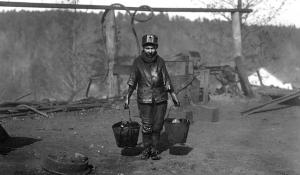
Anna Ortega is a lifelong resident of San Bernardino, California. That city is part of the “Inland Empire” north of Los Angeles, once known for its agricultural industry, now known for being a center for warehousing, trucking, and shipping. In April 2021, Amazon started air operations at the San Bernardino airport. In November of that year, Ortega started working there, sorting packages and braving the sometimes stifling heat. Ortega once dreamed of working her way up the ladder with promotions at Amazon. After finding momentum with an organizing workers’ committee, she is now passionate about making her (in)famous workplace better for her colleagues and community. Ortega shared her story with Green American in April, 2023.
This interview has been edited for length and clarity.
How did you come to work for Amazon?
I was burning through my savings and I really needed a job. [My mom] was working at an Amazon fulfillment center and I was going to apply to the one she was working at, but when I pulled up the Amazon application website, I saw that there was a sign-on bonus for the airport, so I decided to apply there instead. I was actually scared to work at Amazon because I had heard things from other people that have worked at Amazon about the working conditions and what it was like, and so I was fully prepared to quit after six months. But I ended up liking it because of my coworkers. And especially now—the environment that we’re creating, the culture that we’re creating… I really enjoy it.
How did you become involved in worker justice advocacy?
In 2021, the Amazon building where Ortega works had an unannounced closure. A group of affected workers started a petition asking for back pay and policy change regarding unpaid workdays.
When they approached me with the petition, I was honest with them. I told them, ‘I think what you guys are doing is cool, but I don’t want to jeopardize my chances for promoting.’ I thought anybody who signed it was going to get fired. I was scared, and so I declined. But then, the committee delivered the petition and none of them got fired. They didn’t get back pay, but the company gave us a month where we could pick up all the extra time we wanted.
That sent a message. My coworkers got together, they worked, they told the managers, ‘Hey, this is wrong, and you should fix it.’ And they fixed it. And none of them got in trouble. They’re all still here. I thought that was incredibly powerful and after that, I started thinking, hey, that positive change is good. What more can be done?
What is your role?
My department is called Mez [referring to the upper mezzanine level of the building, according to an Amazon job posting]. We do most of the sorting for the building. Most of the sorting happens manually: we take one package at a time, place it on a conveyor or on a robot, scan it, and the conveyor or robot automatically will take it where it needs to go. I get in at 7 a.m. and I leave at 5:30 p.m.
We’re seeing an influx of being sent out of our department to help another department that’s understaffed. It’s pretty unpopular, because we don’t get refresher training on how to do things, and we have to look to the people near us for help because it’s difficult to track down a management member.
I definitely noticed that whenever we hold a delegation, where a group of us goes to talk to a manager, they never say it but we instantly kind of get penalized for it. [Editor’s note: ‘delegation’ is what the workers call it when members of the organizing committee approach management with complaints or concerns. The committee is not recognized formally by Amazon.] We get back from the delegation and back to working and after a few minutes you know, we get sent out of the department and then down in the other department, they’ll say, ‘Why did they send you?’
After the first big action that I took as part of the committee, the next day not a single manager or PA [process assistant, functionally a manager] said anything to me until after like six hours into the shift. Then they pulled a bunch of us to the side like, ‘We just want to let you guys know like we appreciate you, you are welcome to raise your concerns, you can talk to us,’ but it took them six hours to say that.
Anytime we’re going to do a delegation, with work friends who are not part of the committee usually, I give them this talk: ‘They might treat you differently, you’re not imagining it. They will do that.’
Do you feel safe?
It doesn’t always feel like a safe place, no. There’s definitely times when it feels very hectic and everyone seemed frazzled and stressed. Whenever something goes down or something gets jammed, there’s alarms that go off. In those cases, management will still try and push for productivity over safety. I feel like they tend to forget that we’re actual human beings sometimes.
Tell us about the heat you deal with at work and how you addressed issues with it last summer.
The outside department working directly with the planes, they are outside all day in the sun, breathing in the jet fuel and the fumes. They had to walk and walk to find water and have a cool space to sit down and rest if they needed it. On the inside we were dealing with similar issues. There’s an entire department that works adjacent to outside, so they’re letting out the building’s air-conditioned air. There were no fans for them down there, and they didn’t have water in easily accessible areas. If they left their workstations to go and get some, by the time they’d came back, their supervisors were there asking why they were gone for so long, giving them a hard time, when all they wanted was to go and get water.
We realized, no, this isn’t okay, we shouldn’t be dealing with this, so we did two ‘heat delegations.’ We went up to the building’s manager so that we could share our stories and raise our concerns. After that, we saw some pretty big changes. Outside they started giving them their heat breaks, they got really big misters, more ice chests with water. We saw this push from management, letting us know, ‘Hey, remember, pace yourself; don’t overwork yourself; make sure you’re drinking water; if you don’t feel good, take a break.’ We weren’t seeing that before.
Does this create permanent change?
We definitely still have to keep them accountable, we still have to be the ones to [say], ‘Hey, there’s an issue here.’ It needs to be addressed. And then again, ‘Hey, has that issue that I raised the other day been addressed yet?’ [Heat safety measures have] definitely declined a bit since immediately after they were on top of things. Little by little they decline.
[But our organizing committee meets] with each other very often, talk about the issues to try and come up with ways to solve them. At this point, I consider this committee my family because I know that when I have an issue, as hard as it may seem to me in the moment, I know that at the end of the day, I can talk to any one of them. We can get through this together.
What are your plans for the future?
I’m pretty hell-bent on staying here. My involvement over the past year and a half, it’s definitely changed who I am. I really do hope to make this job a better one, and a good one. A job that someone in this community can go to and be able to support [their] family with.
I was born and raised in this city. This is my community. The people who live here deserve better. I do genuinely want to make this a better [opportunity] for the community.







